Research Proposal: Dementia Patients and Family Caregivers
VerifiedAdded on 2022/08/15
|14
|3412
|35
Project
AI Summary
This research proposal outlines a study investigating the experiences of dementia patients, their family members, and caregivers in the UK. The study aims to identify the challenges and issues associated with dementia care, including the impact on caregivers' work and personal lives, and the emotional and practical difficulties faced by patients and families. The proposal includes a literature review of existing research on dementia care, highlighting the gaps in current knowledge, and proposes a mixed-methods approach, combining secondary research of existing data with qualitative primary research through interviews. The research questions focus on understanding the experiences of caregivers and family members, identifying the issues they face, and recommending improved care processes. The methodology includes a systematic literature review using electronic databases, followed by qualitative data collection and thematic analysis. The expected outcomes include a comprehensive understanding of the experiences of those involved in dementia care and recommendations for improved support and care strategies.
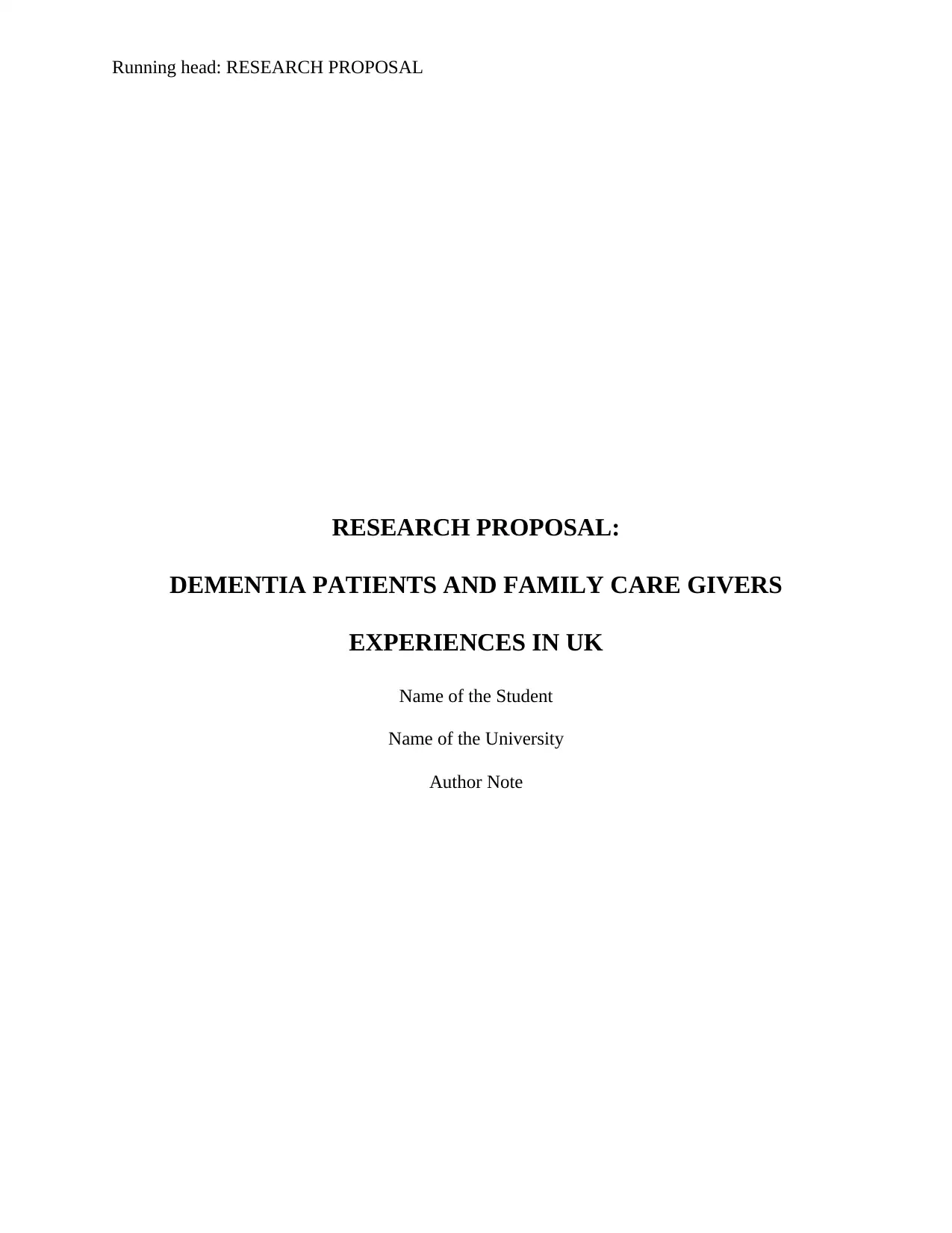
Running head: RESEARCH PROPOSAL
RESEARCH PROPOSAL:
DEMENTIA PATIENTS AND FAMILY CARE GIVERS
EXPERIENCES IN UK
Name of the Student
Name of the University
Author Note
RESEARCH PROPOSAL:
DEMENTIA PATIENTS AND FAMILY CARE GIVERS
EXPERIENCES IN UK
Name of the Student
Name of the University
Author Note
Paraphrase This Document
Need a fresh take? Get an instant paraphrase of this document with our AI Paraphraser
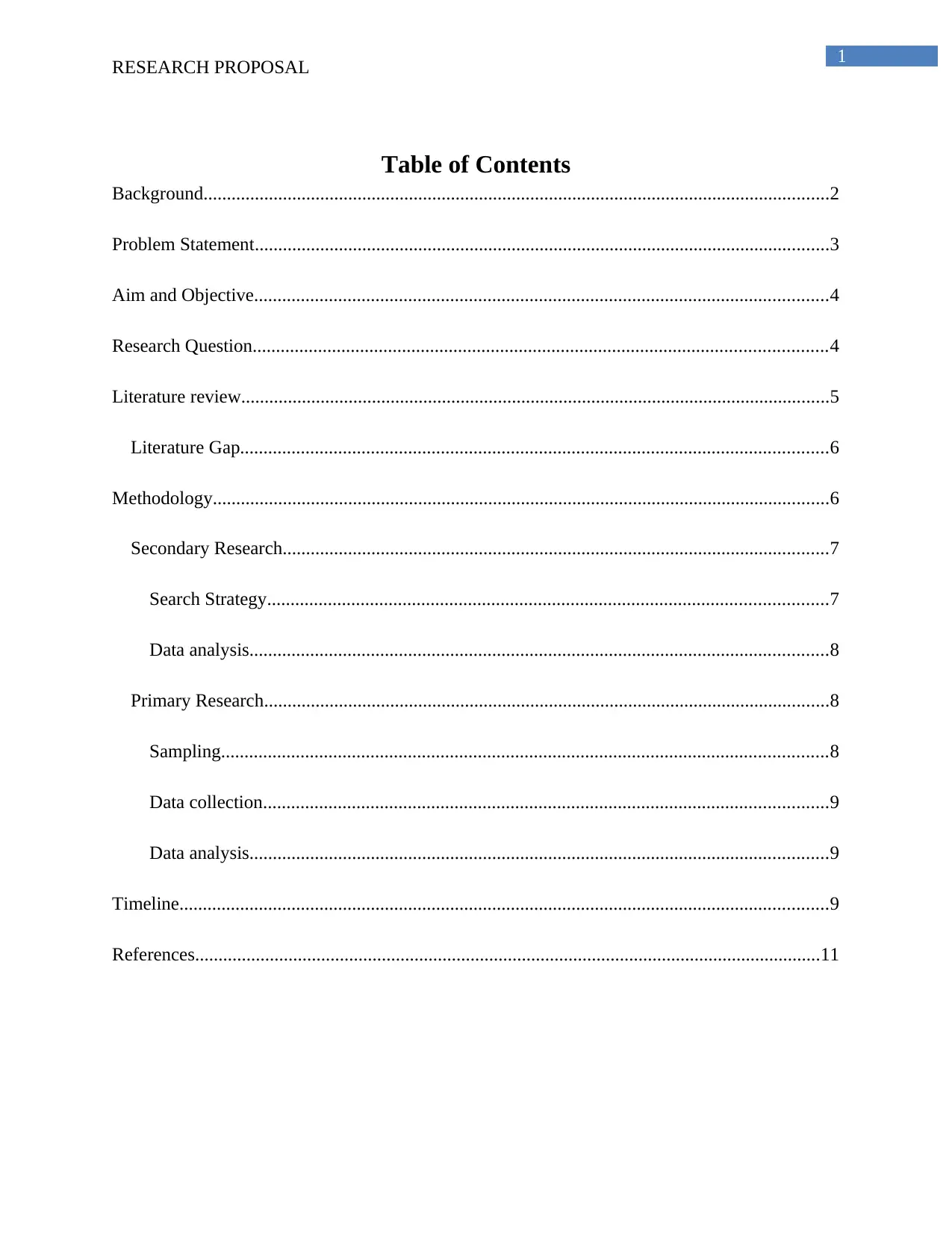
1
RESEARCH PROPOSAL
Table of Contents
Background......................................................................................................................................2
Problem Statement...........................................................................................................................3
Aim and Objective...........................................................................................................................4
Research Question...........................................................................................................................4
Literature review..............................................................................................................................5
Literature Gap..............................................................................................................................6
Methodology....................................................................................................................................6
Secondary Research.....................................................................................................................7
Search Strategy........................................................................................................................7
Data analysis............................................................................................................................8
Primary Research.........................................................................................................................8
Sampling..................................................................................................................................8
Data collection.........................................................................................................................9
Data analysis............................................................................................................................9
Timeline...........................................................................................................................................9
References......................................................................................................................................11
RESEARCH PROPOSAL
Table of Contents
Background......................................................................................................................................2
Problem Statement...........................................................................................................................3
Aim and Objective...........................................................................................................................4
Research Question...........................................................................................................................4
Literature review..............................................................................................................................5
Literature Gap..............................................................................................................................6
Methodology....................................................................................................................................6
Secondary Research.....................................................................................................................7
Search Strategy........................................................................................................................7
Data analysis............................................................................................................................8
Primary Research.........................................................................................................................8
Sampling..................................................................................................................................8
Data collection.........................................................................................................................9
Data analysis............................................................................................................................9
Timeline...........................................................................................................................................9
References......................................................................................................................................11
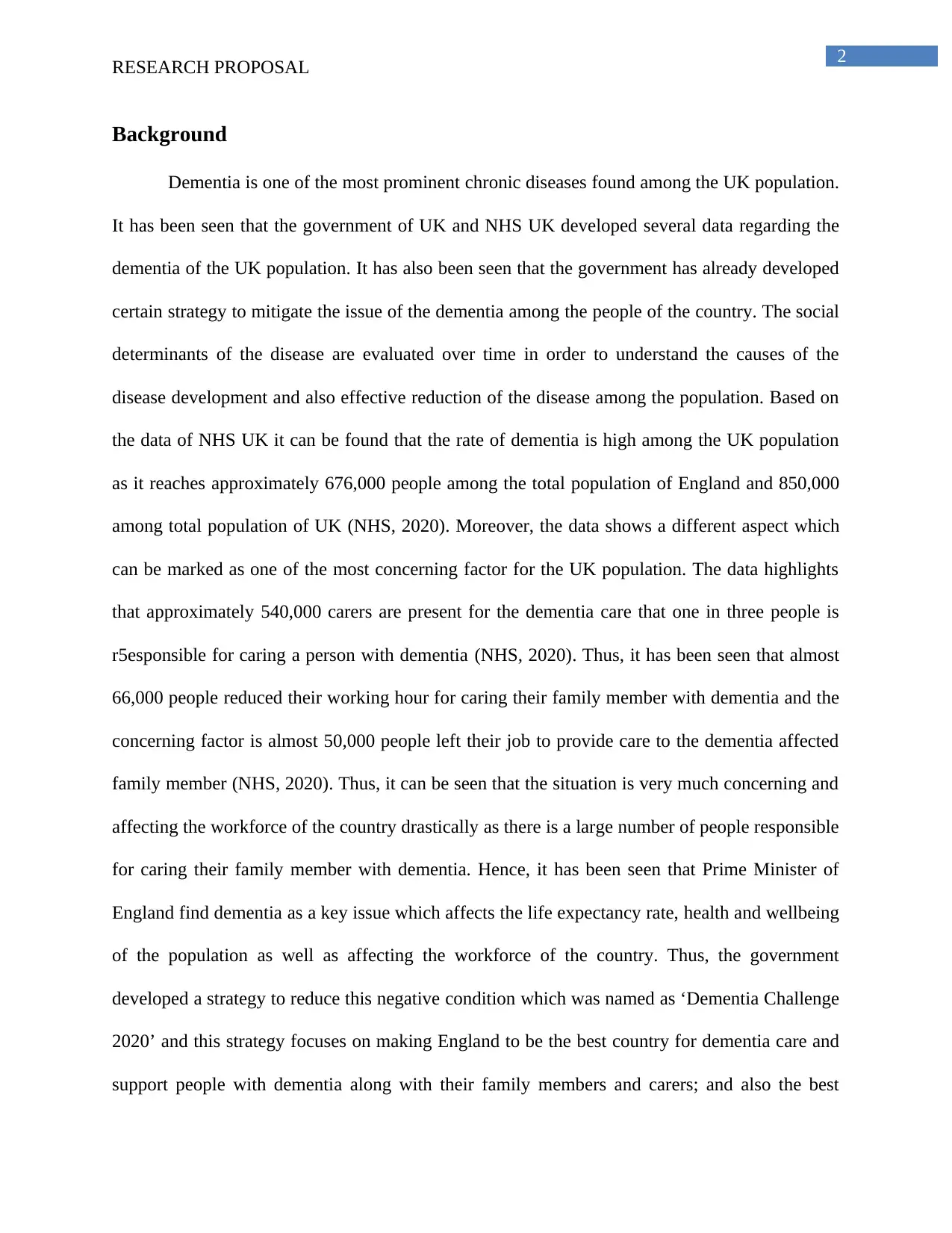
2
RESEARCH PROPOSAL
Background
Dementia is one of the most prominent chronic diseases found among the UK population.
It has been seen that the government of UK and NHS UK developed several data regarding the
dementia of the UK population. It has also been seen that the government has already developed
certain strategy to mitigate the issue of the dementia among the people of the country. The social
determinants of the disease are evaluated over time in order to understand the causes of the
disease development and also effective reduction of the disease among the population. Based on
the data of NHS UK it can be found that the rate of dementia is high among the UK population
as it reaches approximately 676,000 people among the total population of England and 850,000
among total population of UK (NHS, 2020). Moreover, the data shows a different aspect which
can be marked as one of the most concerning factor for the UK population. The data highlights
that approximately 540,000 carers are present for the dementia care that one in three people is
r5esponsible for caring a person with dementia (NHS, 2020). Thus, it has been seen that almost
66,000 people reduced their working hour for caring their family member with dementia and the
concerning factor is almost 50,000 people left their job to provide care to the dementia affected
family member (NHS, 2020). Thus, it can be seen that the situation is very much concerning and
affecting the workforce of the country drastically as there is a large number of people responsible
for caring their family member with dementia. Hence, it has been seen that Prime Minister of
England find dementia as a key issue which affects the life expectancy rate, health and wellbeing
of the population as well as affecting the workforce of the country. Thus, the government
developed a strategy to reduce this negative condition which was named as ‘Dementia Challenge
2020’ and this strategy focuses on making England to be the best country for dementia care and
support people with dementia along with their family members and carers; and also the best
RESEARCH PROPOSAL
Background
Dementia is one of the most prominent chronic diseases found among the UK population.
It has been seen that the government of UK and NHS UK developed several data regarding the
dementia of the UK population. It has also been seen that the government has already developed
certain strategy to mitigate the issue of the dementia among the people of the country. The social
determinants of the disease are evaluated over time in order to understand the causes of the
disease development and also effective reduction of the disease among the population. Based on
the data of NHS UK it can be found that the rate of dementia is high among the UK population
as it reaches approximately 676,000 people among the total population of England and 850,000
among total population of UK (NHS, 2020). Moreover, the data shows a different aspect which
can be marked as one of the most concerning factor for the UK population. The data highlights
that approximately 540,000 carers are present for the dementia care that one in three people is
r5esponsible for caring a person with dementia (NHS, 2020). Thus, it has been seen that almost
66,000 people reduced their working hour for caring their family member with dementia and the
concerning factor is almost 50,000 people left their job to provide care to the dementia affected
family member (NHS, 2020). Thus, it can be seen that the situation is very much concerning and
affecting the workforce of the country drastically as there is a large number of people responsible
for caring their family member with dementia. Hence, it has been seen that Prime Minister of
England find dementia as a key issue which affects the life expectancy rate, health and wellbeing
of the population as well as affecting the workforce of the country. Thus, the government
developed a strategy to reduce this negative condition which was named as ‘Dementia Challenge
2020’ and this strategy focuses on making England to be the best country for dementia care and
support people with dementia along with their family members and carers; and also the best
⊘ This is a preview!⊘
Do you want full access?
Subscribe today to unlock all pages.

Trusted by 1+ million students worldwide
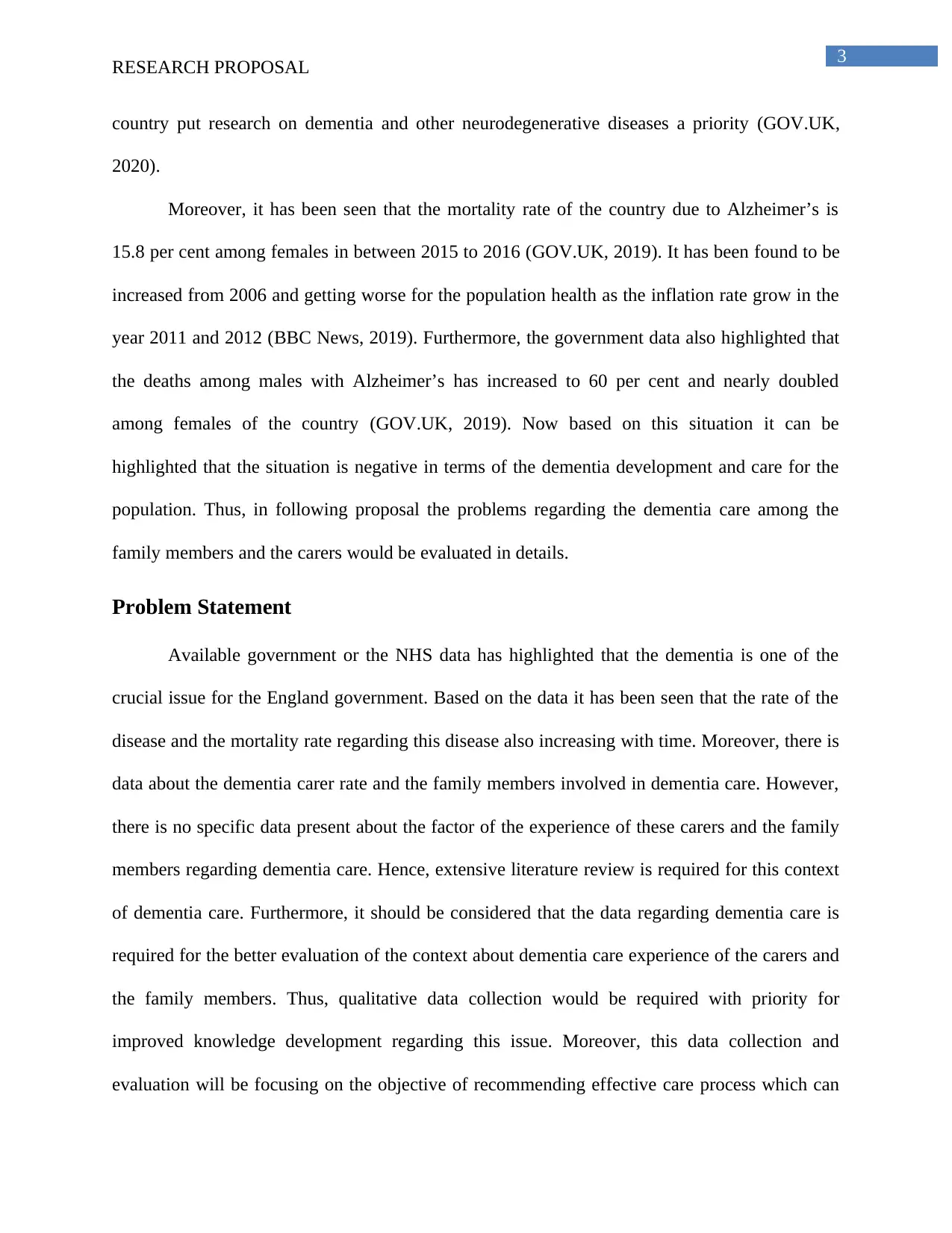
3
RESEARCH PROPOSAL
country put research on dementia and other neurodegenerative diseases a priority (GOV.UK,
2020).
Moreover, it has been seen that the mortality rate of the country due to Alzheimer’s is
15.8 per cent among females in between 2015 to 2016 (GOV.UK, 2019). It has been found to be
increased from 2006 and getting worse for the population health as the inflation rate grow in the
year 2011 and 2012 (BBC News, 2019). Furthermore, the government data also highlighted that
the deaths among males with Alzheimer’s has increased to 60 per cent and nearly doubled
among females of the country (GOV.UK, 2019). Now based on this situation it can be
highlighted that the situation is negative in terms of the dementia development and care for the
population. Thus, in following proposal the problems regarding the dementia care among the
family members and the carers would be evaluated in details.
Problem Statement
Available government or the NHS data has highlighted that the dementia is one of the
crucial issue for the England government. Based on the data it has been seen that the rate of the
disease and the mortality rate regarding this disease also increasing with time. Moreover, there is
data about the dementia carer rate and the family members involved in dementia care. However,
there is no specific data present about the factor of the experience of these carers and the family
members regarding dementia care. Hence, extensive literature review is required for this context
of dementia care. Furthermore, it should be considered that the data regarding dementia care is
required for the better evaluation of the context about dementia care experience of the carers and
the family members. Thus, qualitative data collection would be required with priority for
improved knowledge development regarding this issue. Moreover, this data collection and
evaluation will be focusing on the objective of recommending effective care process which can
RESEARCH PROPOSAL
country put research on dementia and other neurodegenerative diseases a priority (GOV.UK,
2020).
Moreover, it has been seen that the mortality rate of the country due to Alzheimer’s is
15.8 per cent among females in between 2015 to 2016 (GOV.UK, 2019). It has been found to be
increased from 2006 and getting worse for the population health as the inflation rate grow in the
year 2011 and 2012 (BBC News, 2019). Furthermore, the government data also highlighted that
the deaths among males with Alzheimer’s has increased to 60 per cent and nearly doubled
among females of the country (GOV.UK, 2019). Now based on this situation it can be
highlighted that the situation is negative in terms of the dementia development and care for the
population. Thus, in following proposal the problems regarding the dementia care among the
family members and the carers would be evaluated in details.
Problem Statement
Available government or the NHS data has highlighted that the dementia is one of the
crucial issue for the England government. Based on the data it has been seen that the rate of the
disease and the mortality rate regarding this disease also increasing with time. Moreover, there is
data about the dementia carer rate and the family members involved in dementia care. However,
there is no specific data present about the factor of the experience of these carers and the family
members regarding dementia care. Hence, extensive literature review is required for this context
of dementia care. Furthermore, it should be considered that the data regarding dementia care is
required for the better evaluation of the context about dementia care experience of the carers and
the family members. Thus, qualitative data collection would be required with priority for
improved knowledge development regarding this issue. Moreover, this data collection and
evaluation will be focusing on the objective of recommending effective care process which can
Paraphrase This Document
Need a fresh take? Get an instant paraphrase of this document with our AI Paraphraser
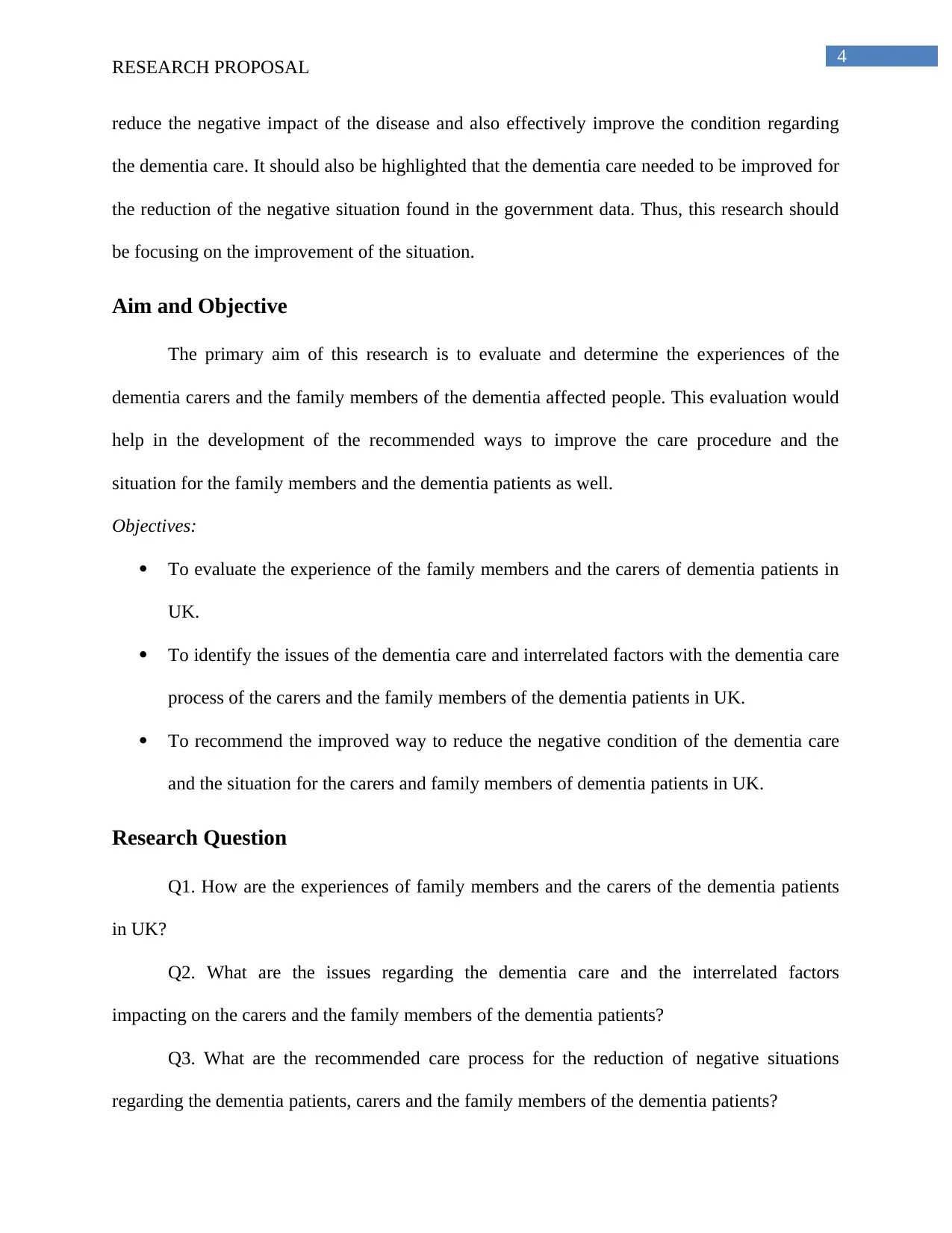
4
RESEARCH PROPOSAL
reduce the negative impact of the disease and also effectively improve the condition regarding
the dementia care. It should also be highlighted that the dementia care needed to be improved for
the reduction of the negative situation found in the government data. Thus, this research should
be focusing on the improvement of the situation.
Aim and Objective
The primary aim of this research is to evaluate and determine the experiences of the
dementia carers and the family members of the dementia affected people. This evaluation would
help in the development of the recommended ways to improve the care procedure and the
situation for the family members and the dementia patients as well.
Objectives:
To evaluate the experience of the family members and the carers of dementia patients in
UK.
To identify the issues of the dementia care and interrelated factors with the dementia care
process of the carers and the family members of the dementia patients in UK.
To recommend the improved way to reduce the negative condition of the dementia care
and the situation for the carers and family members of dementia patients in UK.
Research Question
Q1. How are the experiences of family members and the carers of the dementia patients
in UK?
Q2. What are the issues regarding the dementia care and the interrelated factors
impacting on the carers and the family members of the dementia patients?
Q3. What are the recommended care process for the reduction of negative situations
regarding the dementia patients, carers and the family members of the dementia patients?
RESEARCH PROPOSAL
reduce the negative impact of the disease and also effectively improve the condition regarding
the dementia care. It should also be highlighted that the dementia care needed to be improved for
the reduction of the negative situation found in the government data. Thus, this research should
be focusing on the improvement of the situation.
Aim and Objective
The primary aim of this research is to evaluate and determine the experiences of the
dementia carers and the family members of the dementia affected people. This evaluation would
help in the development of the recommended ways to improve the care procedure and the
situation for the family members and the dementia patients as well.
Objectives:
To evaluate the experience of the family members and the carers of dementia patients in
UK.
To identify the issues of the dementia care and interrelated factors with the dementia care
process of the carers and the family members of the dementia patients in UK.
To recommend the improved way to reduce the negative condition of the dementia care
and the situation for the carers and family members of dementia patients in UK.
Research Question
Q1. How are the experiences of family members and the carers of the dementia patients
in UK?
Q2. What are the issues regarding the dementia care and the interrelated factors
impacting on the carers and the family members of the dementia patients?
Q3. What are the recommended care process for the reduction of negative situations
regarding the dementia patients, carers and the family members of the dementia patients?
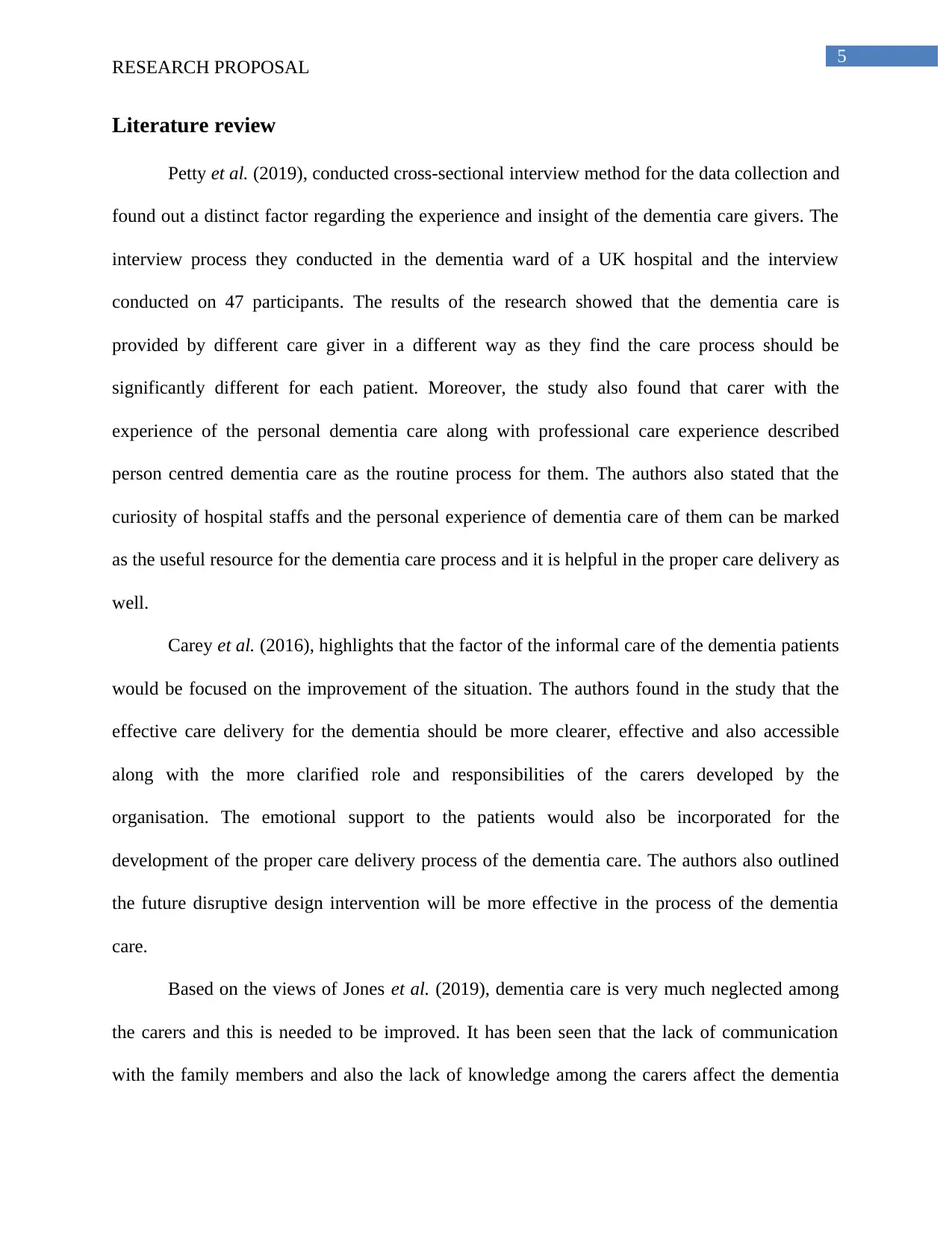
5
RESEARCH PROPOSAL
Literature review
Petty et al. (2019), conducted cross-sectional interview method for the data collection and
found out a distinct factor regarding the experience and insight of the dementia care givers. The
interview process they conducted in the dementia ward of a UK hospital and the interview
conducted on 47 participants. The results of the research showed that the dementia care is
provided by different care giver in a different way as they find the care process should be
significantly different for each patient. Moreover, the study also found that carer with the
experience of the personal dementia care along with professional care experience described
person centred dementia care as the routine process for them. The authors also stated that the
curiosity of hospital staffs and the personal experience of dementia care of them can be marked
as the useful resource for the dementia care process and it is helpful in the proper care delivery as
well.
Carey et al. (2016), highlights that the factor of the informal care of the dementia patients
would be focused on the improvement of the situation. The authors found in the study that the
effective care delivery for the dementia should be more clearer, effective and also accessible
along with the more clarified role and responsibilities of the carers developed by the
organisation. The emotional support to the patients would also be incorporated for the
development of the proper care delivery process of the dementia care. The authors also outlined
the future disruptive design intervention will be more effective in the process of the dementia
care.
Based on the views of Jones et al. (2019), dementia care is very much neglected among
the carers and this is needed to be improved. It has been seen that the lack of communication
with the family members and also the lack of knowledge among the carers affect the dementia
RESEARCH PROPOSAL
Literature review
Petty et al. (2019), conducted cross-sectional interview method for the data collection and
found out a distinct factor regarding the experience and insight of the dementia care givers. The
interview process they conducted in the dementia ward of a UK hospital and the interview
conducted on 47 participants. The results of the research showed that the dementia care is
provided by different care giver in a different way as they find the care process should be
significantly different for each patient. Moreover, the study also found that carer with the
experience of the personal dementia care along with professional care experience described
person centred dementia care as the routine process for them. The authors also stated that the
curiosity of hospital staffs and the personal experience of dementia care of them can be marked
as the useful resource for the dementia care process and it is helpful in the proper care delivery as
well.
Carey et al. (2016), highlights that the factor of the informal care of the dementia patients
would be focused on the improvement of the situation. The authors found in the study that the
effective care delivery for the dementia should be more clearer, effective and also accessible
along with the more clarified role and responsibilities of the carers developed by the
organisation. The emotional support to the patients would also be incorporated for the
development of the proper care delivery process of the dementia care. The authors also outlined
the future disruptive design intervention will be more effective in the process of the dementia
care.
Based on the views of Jones et al. (2019), dementia care is very much neglected among
the carers and this is needed to be improved. It has been seen that the lack of communication
with the family members and also the lack of knowledge among the carers affect the dementia
⊘ This is a preview!⊘
Do you want full access?
Subscribe today to unlock all pages.

Trusted by 1+ million students worldwide
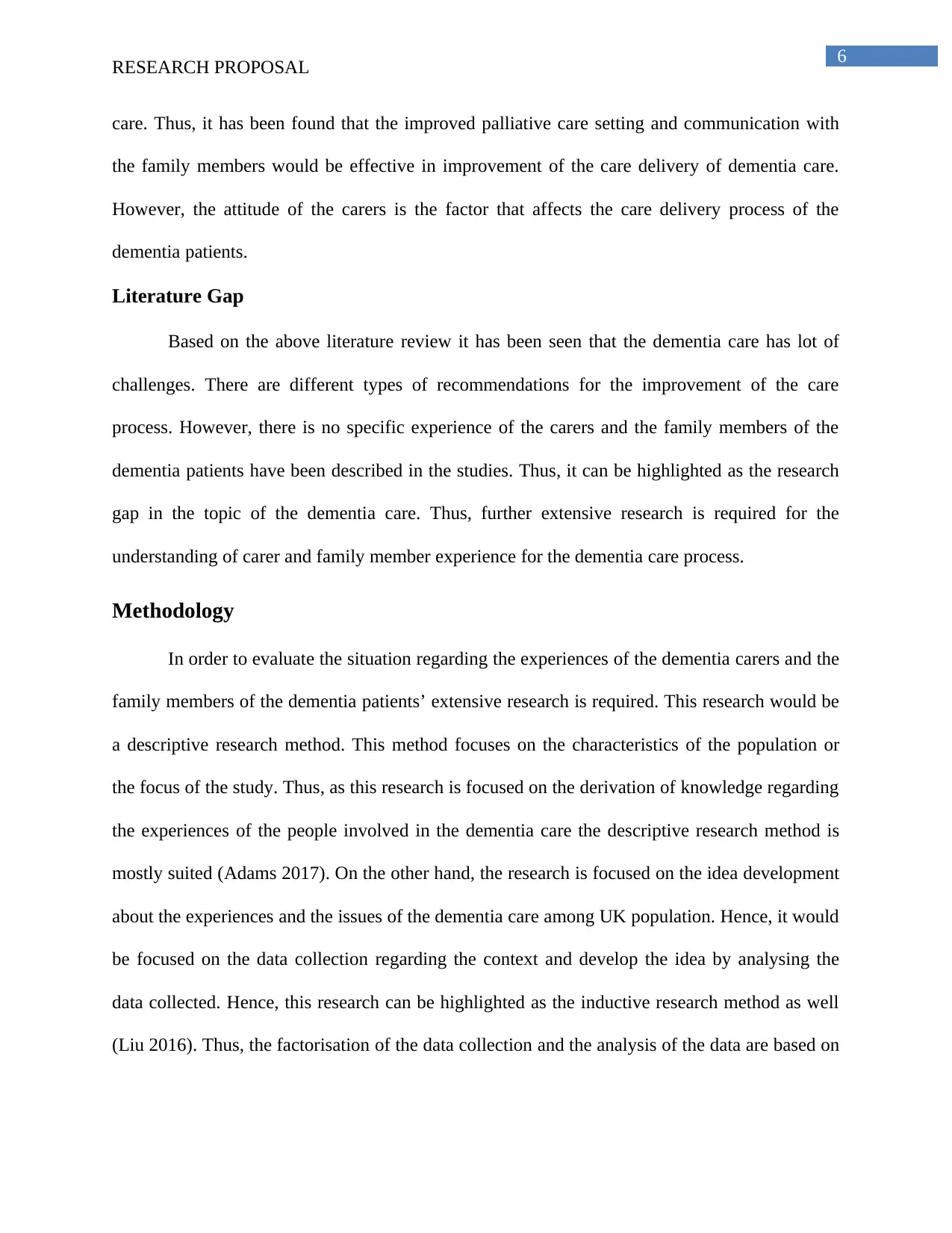
6
RESEARCH PROPOSAL
care. Thus, it has been found that the improved palliative care setting and communication with
the family members would be effective in improvement of the care delivery of dementia care.
However, the attitude of the carers is the factor that affects the care delivery process of the
dementia patients.
Literature Gap
Based on the above literature review it has been seen that the dementia care has lot of
challenges. There are different types of recommendations for the improvement of the care
process. However, there is no specific experience of the carers and the family members of the
dementia patients have been described in the studies. Thus, it can be highlighted as the research
gap in the topic of the dementia care. Thus, further extensive research is required for the
understanding of carer and family member experience for the dementia care process.
Methodology
In order to evaluate the situation regarding the experiences of the dementia carers and the
family members of the dementia patients’ extensive research is required. This research would be
a descriptive research method. This method focuses on the characteristics of the population or
the focus of the study. Thus, as this research is focused on the derivation of knowledge regarding
the experiences of the people involved in the dementia care the descriptive research method is
mostly suited (Adams 2017). On the other hand, the research is focused on the idea development
about the experiences and the issues of the dementia care among UK population. Hence, it would
be focused on the data collection regarding the context and develop the idea by analysing the
data collected. Hence, this research can be highlighted as the inductive research method as well
(Liu 2016). Thus, the factorisation of the data collection and the analysis of the data are based on
RESEARCH PROPOSAL
care. Thus, it has been found that the improved palliative care setting and communication with
the family members would be effective in improvement of the care delivery of dementia care.
However, the attitude of the carers is the factor that affects the care delivery process of the
dementia patients.
Literature Gap
Based on the above literature review it has been seen that the dementia care has lot of
challenges. There are different types of recommendations for the improvement of the care
process. However, there is no specific experience of the carers and the family members of the
dementia patients have been described in the studies. Thus, it can be highlighted as the research
gap in the topic of the dementia care. Thus, further extensive research is required for the
understanding of carer and family member experience for the dementia care process.
Methodology
In order to evaluate the situation regarding the experiences of the dementia carers and the
family members of the dementia patients’ extensive research is required. This research would be
a descriptive research method. This method focuses on the characteristics of the population or
the focus of the study. Thus, as this research is focused on the derivation of knowledge regarding
the experiences of the people involved in the dementia care the descriptive research method is
mostly suited (Adams 2017). On the other hand, the research is focused on the idea development
about the experiences and the issues of the dementia care among UK population. Hence, it would
be focused on the data collection regarding the context and develop the idea by analysing the
data collected. Hence, this research can be highlighted as the inductive research method as well
(Liu 2016). Thus, the factorisation of the data collection and the analysis of the data are based on
Paraphrase This Document
Need a fresh take? Get an instant paraphrase of this document with our AI Paraphraser
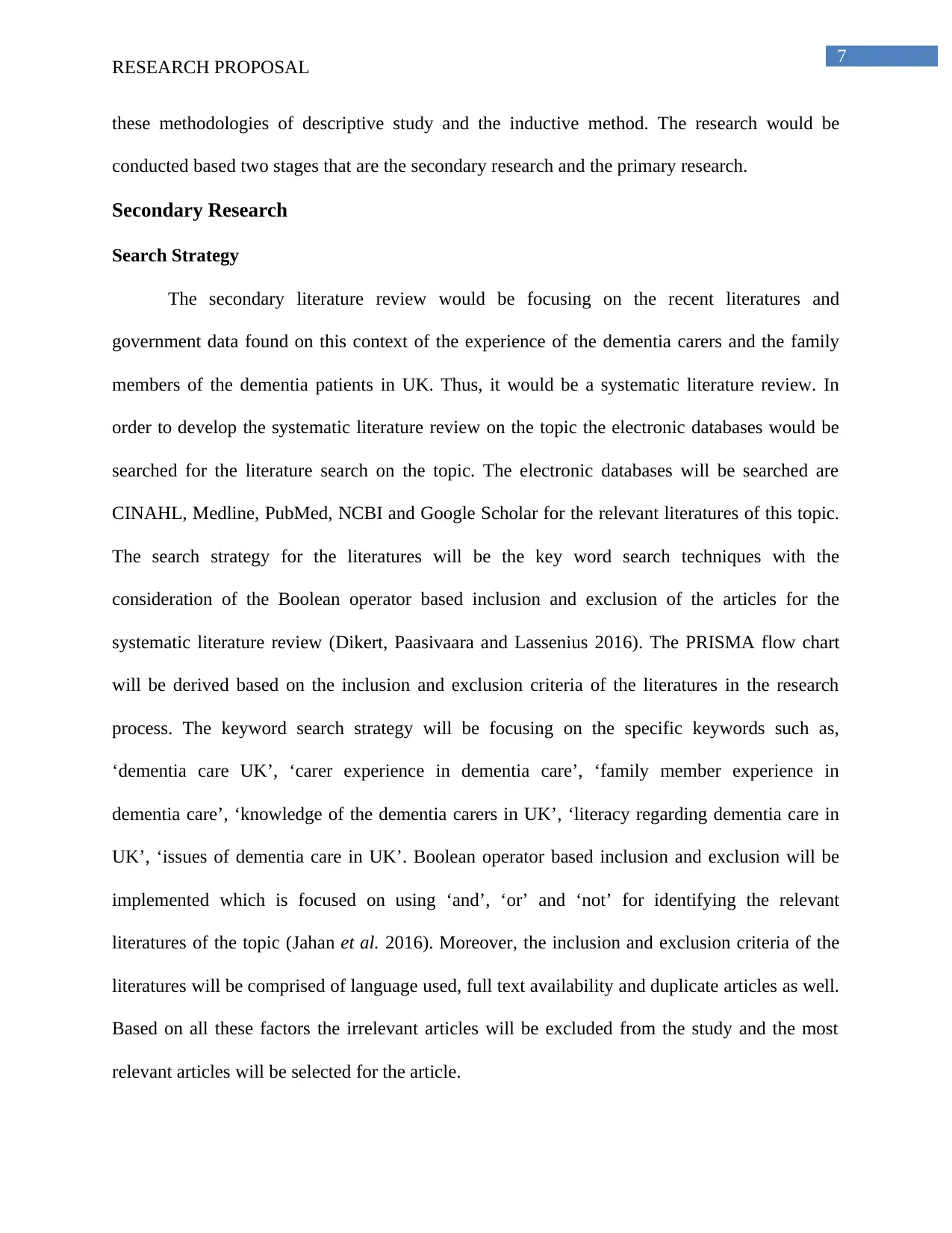
7
RESEARCH PROPOSAL
these methodologies of descriptive study and the inductive method. The research would be
conducted based two stages that are the secondary research and the primary research.
Secondary Research
Search Strategy
The secondary literature review would be focusing on the recent literatures and
government data found on this context of the experience of the dementia carers and the family
members of the dementia patients in UK. Thus, it would be a systematic literature review. In
order to develop the systematic literature review on the topic the electronic databases would be
searched for the literature search on the topic. The electronic databases will be searched are
CINAHL, Medline, PubMed, NCBI and Google Scholar for the relevant literatures of this topic.
The search strategy for the literatures will be the key word search techniques with the
consideration of the Boolean operator based inclusion and exclusion of the articles for the
systematic literature review (Dikert, Paasivaara and Lassenius 2016). The PRISMA flow chart
will be derived based on the inclusion and exclusion criteria of the literatures in the research
process. The keyword search strategy will be focusing on the specific keywords such as,
‘dementia care UK’, ‘carer experience in dementia care’, ‘family member experience in
dementia care’, ‘knowledge of the dementia carers in UK’, ‘literacy regarding dementia care in
UK’, ‘issues of dementia care in UK’. Boolean operator based inclusion and exclusion will be
implemented which is focused on using ‘and’, ‘or’ and ‘not’ for identifying the relevant
literatures of the topic (Jahan et al. 2016). Moreover, the inclusion and exclusion criteria of the
literatures will be comprised of language used, full text availability and duplicate articles as well.
Based on all these factors the irrelevant articles will be excluded from the study and the most
relevant articles will be selected for the article.
RESEARCH PROPOSAL
these methodologies of descriptive study and the inductive method. The research would be
conducted based two stages that are the secondary research and the primary research.
Secondary Research
Search Strategy
The secondary literature review would be focusing on the recent literatures and
government data found on this context of the experience of the dementia carers and the family
members of the dementia patients in UK. Thus, it would be a systematic literature review. In
order to develop the systematic literature review on the topic the electronic databases would be
searched for the literature search on the topic. The electronic databases will be searched are
CINAHL, Medline, PubMed, NCBI and Google Scholar for the relevant literatures of this topic.
The search strategy for the literatures will be the key word search techniques with the
consideration of the Boolean operator based inclusion and exclusion of the articles for the
systematic literature review (Dikert, Paasivaara and Lassenius 2016). The PRISMA flow chart
will be derived based on the inclusion and exclusion criteria of the literatures in the research
process. The keyword search strategy will be focusing on the specific keywords such as,
‘dementia care UK’, ‘carer experience in dementia care’, ‘family member experience in
dementia care’, ‘knowledge of the dementia carers in UK’, ‘literacy regarding dementia care in
UK’, ‘issues of dementia care in UK’. Boolean operator based inclusion and exclusion will be
implemented which is focused on using ‘and’, ‘or’ and ‘not’ for identifying the relevant
literatures of the topic (Jahan et al. 2016). Moreover, the inclusion and exclusion criteria of the
literatures will be comprised of language used, full text availability and duplicate articles as well.
Based on all these factors the irrelevant articles will be excluded from the study and the most
relevant articles will be selected for the article.
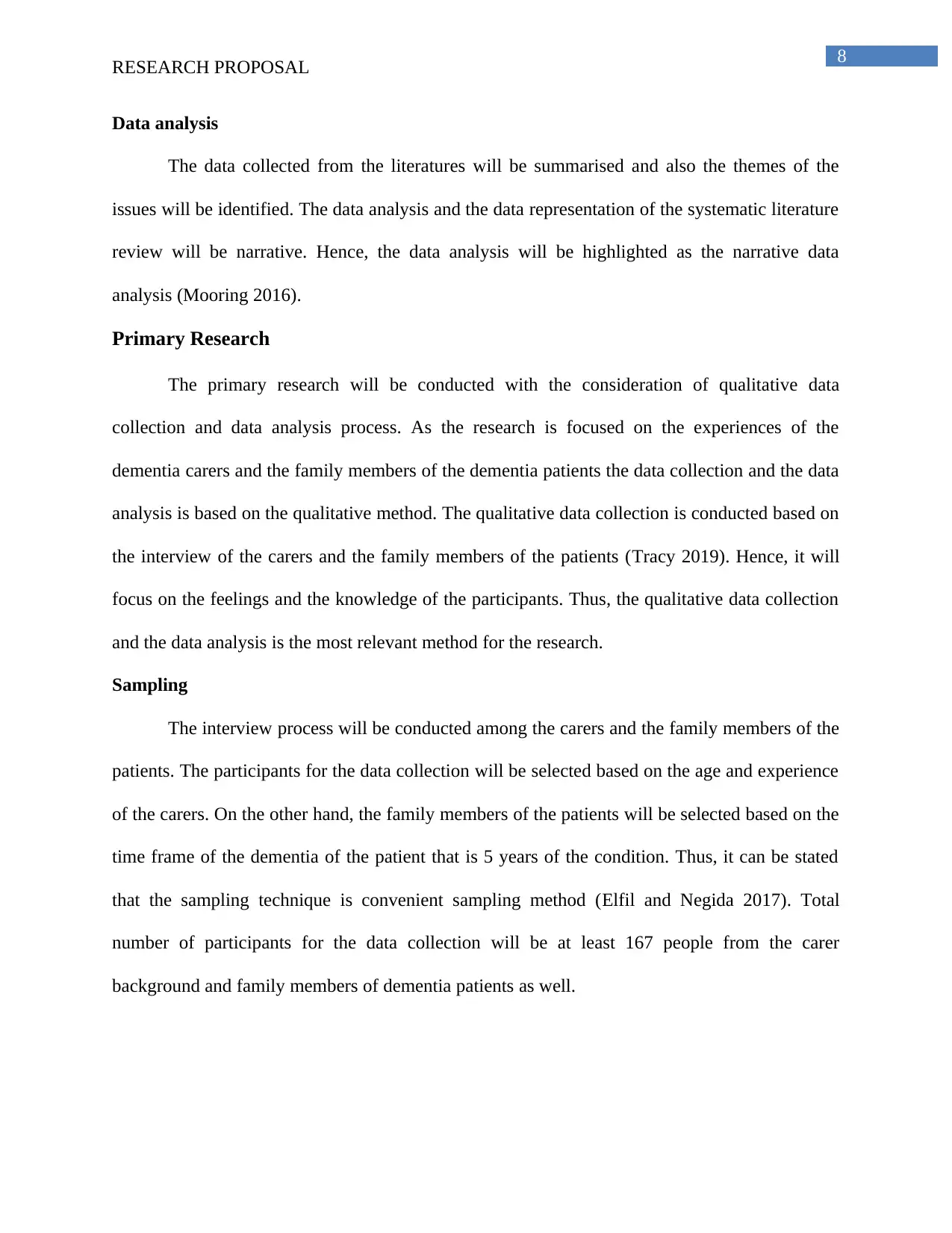
8
RESEARCH PROPOSAL
Data analysis
The data collected from the literatures will be summarised and also the themes of the
issues will be identified. The data analysis and the data representation of the systematic literature
review will be narrative. Hence, the data analysis will be highlighted as the narrative data
analysis (Mooring 2016).
Primary Research
The primary research will be conducted with the consideration of qualitative data
collection and data analysis process. As the research is focused on the experiences of the
dementia carers and the family members of the dementia patients the data collection and the data
analysis is based on the qualitative method. The qualitative data collection is conducted based on
the interview of the carers and the family members of the patients (Tracy 2019). Hence, it will
focus on the feelings and the knowledge of the participants. Thus, the qualitative data collection
and the data analysis is the most relevant method for the research.
Sampling
The interview process will be conducted among the carers and the family members of the
patients. The participants for the data collection will be selected based on the age and experience
of the carers. On the other hand, the family members of the patients will be selected based on the
time frame of the dementia of the patient that is 5 years of the condition. Thus, it can be stated
that the sampling technique is convenient sampling method (Elfil and Negida 2017). Total
number of participants for the data collection will be at least 167 people from the carer
background and family members of dementia patients as well.
RESEARCH PROPOSAL
Data analysis
The data collected from the literatures will be summarised and also the themes of the
issues will be identified. The data analysis and the data representation of the systematic literature
review will be narrative. Hence, the data analysis will be highlighted as the narrative data
analysis (Mooring 2016).
Primary Research
The primary research will be conducted with the consideration of qualitative data
collection and data analysis process. As the research is focused on the experiences of the
dementia carers and the family members of the dementia patients the data collection and the data
analysis is based on the qualitative method. The qualitative data collection is conducted based on
the interview of the carers and the family members of the patients (Tracy 2019). Hence, it will
focus on the feelings and the knowledge of the participants. Thus, the qualitative data collection
and the data analysis is the most relevant method for the research.
Sampling
The interview process will be conducted among the carers and the family members of the
patients. The participants for the data collection will be selected based on the age and experience
of the carers. On the other hand, the family members of the patients will be selected based on the
time frame of the dementia of the patient that is 5 years of the condition. Thus, it can be stated
that the sampling technique is convenient sampling method (Elfil and Negida 2017). Total
number of participants for the data collection will be at least 167 people from the carer
background and family members of dementia patients as well.
⊘ This is a preview!⊘
Do you want full access?
Subscribe today to unlock all pages.

Trusted by 1+ million students worldwide
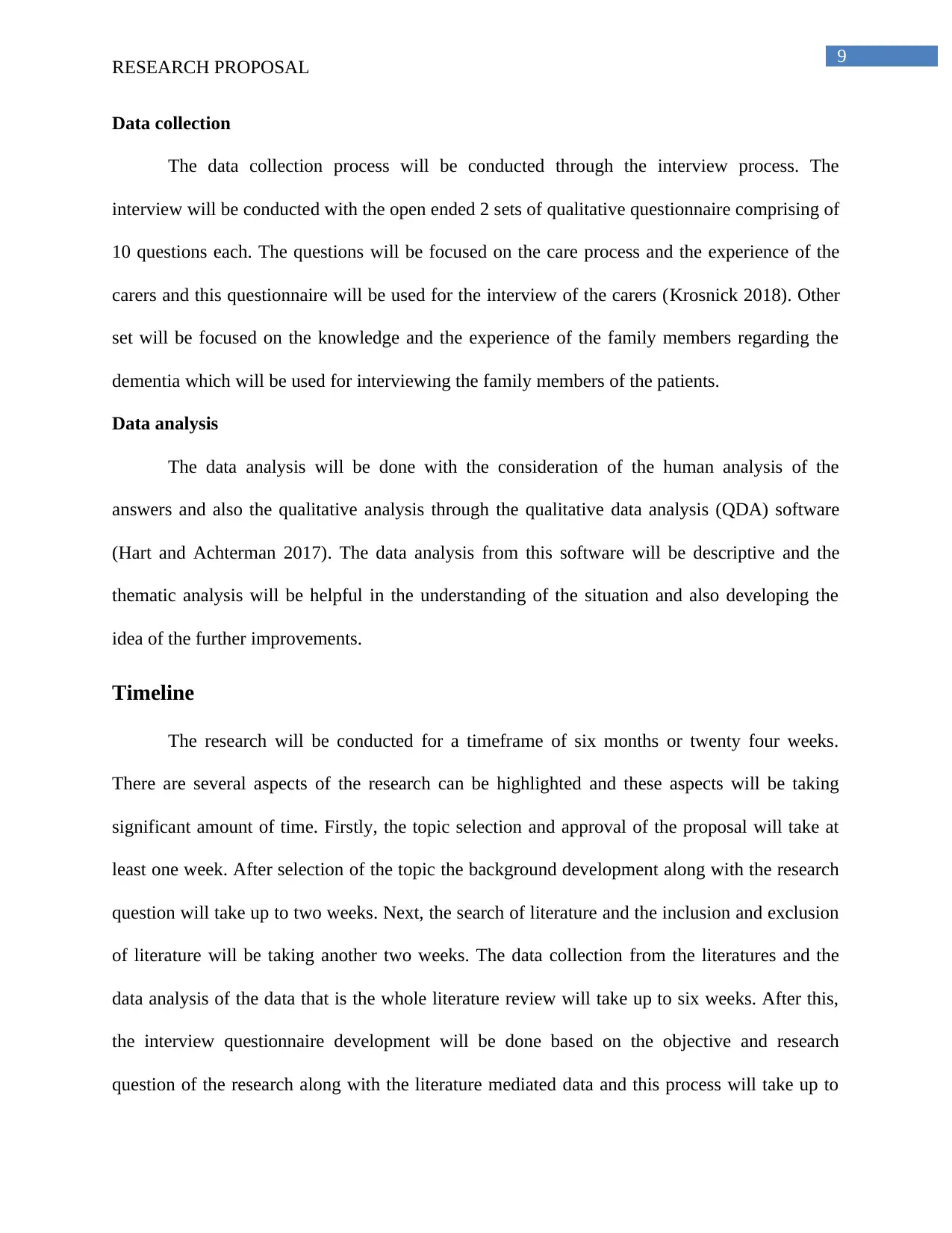
9
RESEARCH PROPOSAL
Data collection
The data collection process will be conducted through the interview process. The
interview will be conducted with the open ended 2 sets of qualitative questionnaire comprising of
10 questions each. The questions will be focused on the care process and the experience of the
carers and this questionnaire will be used for the interview of the carers (Krosnick 2018). Other
set will be focused on the knowledge and the experience of the family members regarding the
dementia which will be used for interviewing the family members of the patients.
Data analysis
The data analysis will be done with the consideration of the human analysis of the
answers and also the qualitative analysis through the qualitative data analysis (QDA) software
(Hart and Achterman 2017). The data analysis from this software will be descriptive and the
thematic analysis will be helpful in the understanding of the situation and also developing the
idea of the further improvements.
Timeline
The research will be conducted for a timeframe of six months or twenty four weeks.
There are several aspects of the research can be highlighted and these aspects will be taking
significant amount of time. Firstly, the topic selection and approval of the proposal will take at
least one week. After selection of the topic the background development along with the research
question will take up to two weeks. Next, the search of literature and the inclusion and exclusion
of literature will be taking another two weeks. The data collection from the literatures and the
data analysis of the data that is the whole literature review will take up to six weeks. After this,
the interview questionnaire development will be done based on the objective and research
question of the research along with the literature mediated data and this process will take up to
RESEARCH PROPOSAL
Data collection
The data collection process will be conducted through the interview process. The
interview will be conducted with the open ended 2 sets of qualitative questionnaire comprising of
10 questions each. The questions will be focused on the care process and the experience of the
carers and this questionnaire will be used for the interview of the carers (Krosnick 2018). Other
set will be focused on the knowledge and the experience of the family members regarding the
dementia which will be used for interviewing the family members of the patients.
Data analysis
The data analysis will be done with the consideration of the human analysis of the
answers and also the qualitative analysis through the qualitative data analysis (QDA) software
(Hart and Achterman 2017). The data analysis from this software will be descriptive and the
thematic analysis will be helpful in the understanding of the situation and also developing the
idea of the further improvements.
Timeline
The research will be conducted for a timeframe of six months or twenty four weeks.
There are several aspects of the research can be highlighted and these aspects will be taking
significant amount of time. Firstly, the topic selection and approval of the proposal will take at
least one week. After selection of the topic the background development along with the research
question will take up to two weeks. Next, the search of literature and the inclusion and exclusion
of literature will be taking another two weeks. The data collection from the literatures and the
data analysis of the data that is the whole literature review will take up to six weeks. After this,
the interview questionnaire development will be done based on the objective and research
question of the research along with the literature mediated data and this process will take up to
Paraphrase This Document
Need a fresh take? Get an instant paraphrase of this document with our AI Paraphraser

10
RESEARCH PROPOSAL
one week. The participant selection and interview process will be conducted for at least four
weeks. After the data collection is done from the interview process the data will be analysed and
this analysis process will take at least six weeks. Finally, analysed data that is the result,
discussion based on the data and conclusion of the research will be developed and written up and
this will take up to two weeks. Hence, the total literature review, data collection through
interview and data analysis along with conclusion development will take at least twenty four
weeks.
RESEARCH PROPOSAL
one week. The participant selection and interview process will be conducted for at least four
weeks. After the data collection is done from the interview process the data will be analysed and
this analysis process will take at least six weeks. Finally, analysed data that is the result,
discussion based on the data and conclusion of the research will be developed and written up and
this will take up to two weeks. Hence, the total literature review, data collection through
interview and data analysis along with conclusion development will take at least twenty four
weeks.
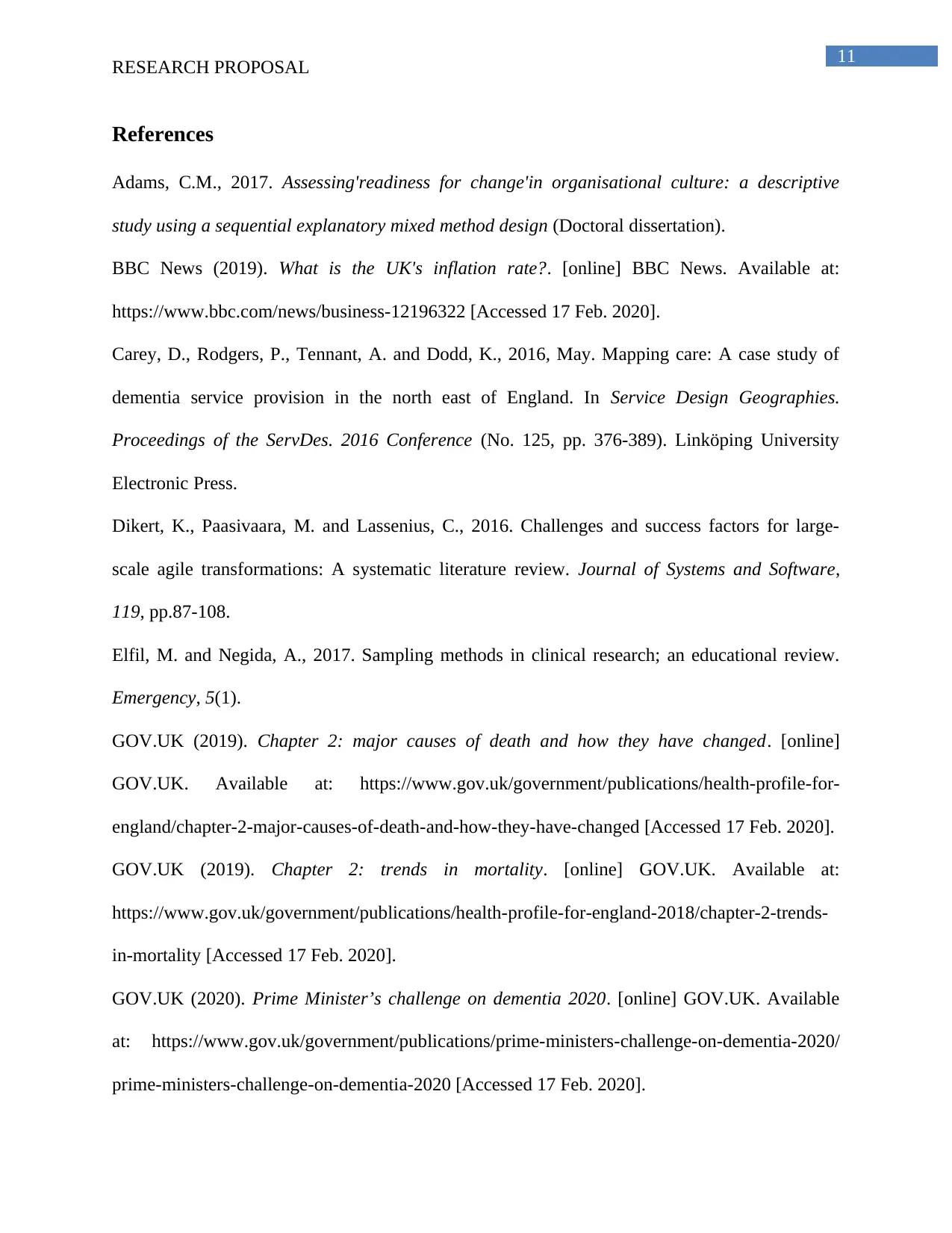
11
RESEARCH PROPOSAL
References
Adams, C.M., 2017. Assessing'readiness for change'in organisational culture: a descriptive
study using a sequential explanatory mixed method design (Doctoral dissertation).
BBC News (2019). What is the UK's inflation rate?. [online] BBC News. Available at:
https://www.bbc.com/news/business-12196322 [Accessed 17 Feb. 2020].
Carey, D., Rodgers, P., Tennant, A. and Dodd, K., 2016, May. Mapping care: A case study of
dementia service provision in the north east of England. In Service Design Geographies.
Proceedings of the ServDes. 2016 Conference (No. 125, pp. 376-389). Linköping University
Electronic Press.
Dikert, K., Paasivaara, M. and Lassenius, C., 2016. Challenges and success factors for large-
scale agile transformations: A systematic literature review. Journal of Systems and Software,
119, pp.87-108.
Elfil, M. and Negida, A., 2017. Sampling methods in clinical research; an educational review.
Emergency, 5(1).
GOV.UK (2019). Chapter 2: major causes of death and how they have changed. [online]
GOV.UK. Available at: https://www.gov.uk/government/publications/health-profile-for-
england/chapter-2-major-causes-of-death-and-how-they-have-changed [Accessed 17 Feb. 2020].
GOV.UK (2019). Chapter 2: trends in mortality. [online] GOV.UK. Available at:
https://www.gov.uk/government/publications/health-profile-for-england-2018/chapter-2-trends-
in-mortality [Accessed 17 Feb. 2020].
GOV.UK (2020). Prime Minister’s challenge on dementia 2020. [online] GOV.UK. Available
at: https://www.gov.uk/government/publications/prime-ministers-challenge-on-dementia-2020/
prime-ministers-challenge-on-dementia-2020 [Accessed 17 Feb. 2020].
RESEARCH PROPOSAL
References
Adams, C.M., 2017. Assessing'readiness for change'in organisational culture: a descriptive
study using a sequential explanatory mixed method design (Doctoral dissertation).
BBC News (2019). What is the UK's inflation rate?. [online] BBC News. Available at:
https://www.bbc.com/news/business-12196322 [Accessed 17 Feb. 2020].
Carey, D., Rodgers, P., Tennant, A. and Dodd, K., 2016, May. Mapping care: A case study of
dementia service provision in the north east of England. In Service Design Geographies.
Proceedings of the ServDes. 2016 Conference (No. 125, pp. 376-389). Linköping University
Electronic Press.
Dikert, K., Paasivaara, M. and Lassenius, C., 2016. Challenges and success factors for large-
scale agile transformations: A systematic literature review. Journal of Systems and Software,
119, pp.87-108.
Elfil, M. and Negida, A., 2017. Sampling methods in clinical research; an educational review.
Emergency, 5(1).
GOV.UK (2019). Chapter 2: major causes of death and how they have changed. [online]
GOV.UK. Available at: https://www.gov.uk/government/publications/health-profile-for-
england/chapter-2-major-causes-of-death-and-how-they-have-changed [Accessed 17 Feb. 2020].
GOV.UK (2019). Chapter 2: trends in mortality. [online] GOV.UK. Available at:
https://www.gov.uk/government/publications/health-profile-for-england-2018/chapter-2-trends-
in-mortality [Accessed 17 Feb. 2020].
GOV.UK (2020). Prime Minister’s challenge on dementia 2020. [online] GOV.UK. Available
at: https://www.gov.uk/government/publications/prime-ministers-challenge-on-dementia-2020/
prime-ministers-challenge-on-dementia-2020 [Accessed 17 Feb. 2020].
⊘ This is a preview!⊘
Do you want full access?
Subscribe today to unlock all pages.

Trusted by 1+ million students worldwide
1 out of 14
Related Documents
Your All-in-One AI-Powered Toolkit for Academic Success.
+13062052269
info@desklib.com
Available 24*7 on WhatsApp / Email
![[object Object]](/_next/static/media/star-bottom.7253800d.svg)
Unlock your academic potential
Copyright © 2020–2026 A2Z Services. All Rights Reserved. Developed and managed by ZUCOL.





